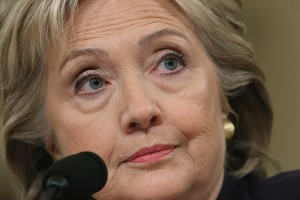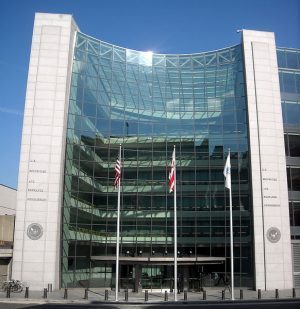Insider Trading
-
 Morning Docket
Morning DocketMorning Docket: 12.28.16
* “Absent a showing that the requested enforcement action could not shake loose a few more emails, the case is not moot.” Because 2016 isn’t over yet and we love kicking horses thought to be dead, the D.C. Circuit has revived a legal challenge regarding Hillary Clinton’s private email server that was once considered to be moot. [Reuters]
* The Supreme Court may be taking a turn to the conservative side come 2017, but not immediately. It’s expected that shortly after his inauguration, President Trump will announce his nominee in either late January or early February, with confirmation hearings held in March, and a vote sometime in April. By the time a new justice is sworn in, there will be just a few days left of oral arguments for the current Term. [NPR]
* “This case of cyber meets securities fraud should serve as a wake-up call for law firms around the world.” Three Chinese hackers have been charged with breaking into the servers of several Biglaw firms — firms like Cravath and Weil Gotshal — to illegally trade on stolen information. They made more than $4 million, but only one of them has been arrested thus far and is awaiting extradition to the United States. [Bloomberg]
* “Providing a profit motive to make arrests gives officers an incentive to make improper arrests.” In counties across the country, those who are arrested must pay “booking fees,” regardless of whether or not they are found guilty of their crimes. Two cases regarding these fees will soon be heard by the Supreme Court in early 2017, and one county was so brazen that it didn’t even bother to submit a brief in opposition. [New York Times]
* If you’re applying to law school, you may be wondering how you can make the strongest argument for your acceptance in your application. Focus on your essays and make sure that you provide compelling examples of the type of person you are and your career goals. If you can sway just one person on the admissions committee to give you a chance, then you might soon find an acceptance letter with your name on it. [U.S. News]
-
 White-Collar Crime
White-Collar CrimeSalman, Snitches, And The Curiously Virtuous World Of Insider Trading
Snitches get landmark Supreme Court wins.  Sponsored
SponsoredIs The Future Of Law Distributed? Lessons From The Tech Adoption Curve
The rise of remote work has dramatically reshaped the relationship between Lawyers and Law Firms, see how Scale LLP has taken the steps to get…-
 Supreme Court
Supreme CourtSupreme Court Puts Price On A Brother’s Love
Siblings who freely share insider information receive a “personal benefit” tantamount to cash, apparently.
-
 Morning Docket
Morning DocketMorning Docket: 10.05.16
* Who recently made partner at Kirkland & Ellis, Covington & Burling, Goodwin Procter, and Curtis Mallet-Prevost? Here’s a nice round-up that highlights the names of the 112 associates who were promoted at these four firms. Don’t be too shocked by that high number; the vast majority of partner promotions were made at Kirkland, where 81 attorneys were welcomed into the ranks of the firm’s non-equity partnership. [Big Law Business]
* In what’s hailed as a victory for gay rights, Massachusetts expanded the legal definition of the word “parent” to be read “in a gender-neutral manner, to apply where a child is ‘born to [two people], is received into their joint home, and is held out by both as their own child.'” The state’s high court also allowed parentage laws to be construed to apply to members of same-sex couples without biological ties to the children. [WSJ Law Blog]
* Today, SCOTUS will hear arguments in a case challenging “judge-made law,” that is, what is and isn’t considered insider trading. If you trade on information received from a third party who received it from an insider, is that insider trading? Even Mark Cuban wants to know, writing in an amicus brief that “no one should be prosecuted for conduct that Congress is either unwilling or unable to define.” [DealBook / New York Times]
* The Oklahoma Supreme Court struck down a law that forced abortion providers to save fetal tissue samples from patients younger than 14 years old, on top of other broad restrictions. The court unanimously ruled that the law violated the state constitution’s “one subject” rule. In a separate concurrence, four judges would’ve struck down the law as an unconstitutional burden on a woman’s right to have an abortion. [Reuters]
* Much like America, the Supreme Court seems to have a problem with race this Term. The high court will be hearing three divisive cases having to do with racial slurs, racial rhetoric, and racial epithets, and the Court may very well be divided along ideological lines, resulting in 4-4 deadlocks thanks to the seat left vacant by the late Justice Antonin Scalia and the Senate’s refusal to give Judge Merrick Garland a hearing. [CNN]
-
 Insider Trading
Insider TradingBehold, The Shakespearean Plot Twist At The Heart Of The Cooperman Insider Trading Case
Coming soon to an old-timey theater near you! -
 Hedge Funds / Private Equity, Securities and Exchange Commission
Hedge Funds / Private Equity, Securities and Exchange CommissionThe Next Time Leon Cooperman (Allegedly) Engages In Insider Trading, It’ll Be In Shares Of A Company Whose Execs Will Lie To The SEC For Him
Goddamn corporate hacks and their need to honest with the Securities and Exchange Commission. -
 Morning Docket
Morning DocketMorning Docket: 09.15.16
* Judge Posner tells lawyer for Mike Pence: “You are so out of it.” Was he talking about the case or the election? [LA Times]
* Vibrator sparks class action of bachelorette party attendee class. [Corporate Counsel]
* Bayer is looking to buy Monsanto and multiple Biglaw firms are working on this headache. [The Am Law Daily]
* Former Simpson Thacher clerk gets 46 months for insider trading. [Law360]
* Guess who is funding the battle over pot legalization? [The Intercept]
* The next Brown v. Board? [Law.com]
* The least shocking lawsuit award goes to this suit claims Georgia’s voter registration laws violate federal law. [ABC News]
-
 Insider Trading
Insider TradingSon Half Of Father/Son Insider Trading Duo Found Guilty
Unfortunately for Stewart the Younger, a jury has gone with prosecutors’ version of the events.  Sponsored
SponsoredNavigating Financial Success by Avoiding Common Pitfalls and Maximizing Firm Performance
In this CLE-eligible webinar, we’ll explore the most common accounting pitfalls and how to avoid them for your firm.-
 Morning Docket
Morning DocketMorning Docket: 08.16.16
* Many Biglaw firms have raised their salary scales, but that’s not all they’ve done in recent months to attract talent. Considering “the war for talent is intensifying,” firms are offering perks like generous parental leave and adoption assistance, student loan assistance, and lifestyle benefits. We may have more on this later today. [Big Law Business]
* A former deputy prosecutor in Vermont alleges she was paid less than a man working in the same position. She claims that a male attorney who was hired after she was earned a salary that was 26 percent higher than her own, despite the fact that they “performed equal work that required equal skill, effort, and responsibility.” [Burlington Free Press]
* The bulk of insider trading cases used to be handled by the SEC through civil suits, but now the DOJ has muscled in on the action with criminal prosecutions. What’s the difference between a case that merits a civil suit and a case that results in criminal charges? That’s what attorneys are trying to figure out. [DealBook / New York Times]
* “I think there’s a deep skepticism about the value of these programs.” Looking for a law degree as a professional that won’t set you back too far in terms of cost? Try a master’s of jurisprudence on for size. It’s considered law school for non-lawyers, and it might make actual lawyers question the validity of the degree in the first place. Hmm… [Marketplace]
* If you’re a prospective law student working on an application, it may be wise to try to incorporate a summer internship into your personal statement if it helped shape your desire to pursue a career in law, but remember, “there’s no magic internship that’s going to get someone admitted into law school.” [Law Admissions Lowdown / U.S. News]
-
 Insider Trading, Wall Street, White-Collar Crime
Insider Trading, Wall Street, White-Collar CrimeIf You Want Some Insider Intel From A Client, Get Him Liquored Up
Criminal charges for a former Biglaw partner and his investment adviser. -
 Morning Docket
Morning DocketMorning Docket: 08.11.16
* “Could a firm with a different business model suffer, potentially, if they don’t match the $180,000? Maybe.” Law firms may be competing for fewer students than in years prior thanks to decreased law school enrollment, but Biglaw’s new starting salary scale doesn’t seem to have made a big impact on the summer associate applicant pool — at most schools, OCI participation has held steady or risen only slightly since last year. [Law.com]
* “Are you listening? He just flat out lied. … [I]t could be bad.” In a text message that was included in a federal court filing earlier this week, a former aide to New Jersey Governor Chris Christie claimed that the governor lied when he told the media none of his staff knew about a plan to block George Washington Bridge traffic. Uh-oh! [New York Times]
* “We’ll tell the council that there’s a giant need for affordable law schools like us, and we’re going to meet that need.” After learning it was unlikely his school would receive accreditation due to students’ poor qualifications, Dean Royal Furgeson Jr. of UNT Dallas Law shrugged it off, saying the school would “get a fair hearing.” [ABA Journal]
* Robert Schulman, a former partner at Hunton & Williams, has been indicted for allegedly trading on insider information ahead of Pfizer’s $3.6 billion purchase of King Pharmaceuticals, a client he represented in 2010 while at the firm. He, along with his investment adviser, will face up to 20 years in prison if convicted. [Big Law Business]
* Yet another Biglaw firm has partnered with a financial company to assist its attorneys with their law school debt. Miller Canfield is working with Social Finance (SoFi) to provide loan refinancing options to the firm’s associates to help “ease the financial burden” of their heavy six-figure debt loads. [Grand Rapids Business Journal]
* “They’re being terribly exploited.” Lichten and Bright, a New York labor law firm, has contacted hundreds of UFC fighters in an effort to unionize them and help get them benefits that other sports unions share, like health insurance, pensions, and the ability to negotiate the terms of their contracts with the mixed martial arts giant. [MMA Junkie]
-

-
 Antonin Scalia, Insider Trading
Antonin Scalia, Insider TradingWhat Happens If The Supreme Court Defines Insider Trading And Nino Scalia Isn’t There To Vote On It?
Where does the Notorious RBG stand on what constitutes a 'golf tip'?
Sponsored

Is The Future Of Law Distributed? Lessons From The Tech Adoption Curve

Generative AI In Legal Work — What’s Fact And What’s Fiction?


Navigating Financial Success by Avoiding Common Pitfalls and Maximizing Firm Performance
Sponsored

The Business Case For AI At Your Law Firm


Legal AI: 3 Steps Law Firms Should Take Now
-
 Crime, Insider Trading
Crime, Insider TradingGeorgia Broker Sorry About All Those Times He Traded On Information Purchased From Ukrainian Hackers
Won’t happen again, scout’s honor. -
 Morning Docket
Morning DocketMorning Docket: 08.02.16
* “This feels like an agency that is out of step with a crisis in its profession.” The transcript from the National Advisory Committee on Institutional Quality and Integrity is finally out, and those who voted to suspend the ABA’s power to accredit law schools sought to “send a signal” about student loans and accreditation enforcement. [ABA Journal]
* “Having a woman reach this milestone opens the door for us. We are allies in the struggle and we can’t do this by ourselves.” Women in the law fight to break through the glass ceiling every day, and Hillary Clinton’s nomination as the Democratic presidential candidate has served as an inspiration to continue the battle. [Big Law Business]
* Which are the best law schools for getting federal clerkship a after graduation? Aside from the incredibly obvious ones, you may actually be surprised by some of the schools that made the list. For those of you who are interested in getting a clerkship bonus when you head to your firm, we’ll have more information on this later. [Business Insider]
* Sorry, but your law review note might get preempted… Thanks to a split between the First and Second Circuits, in its upcoming term, the Supreme Court will decide what type of benefit must be provided to prove a quid pro quo arrangement, which could likely redefine insider trading law as we’ve come to know it. [DealBook / New York Times]
* Talk about some expensive beauty queen drama: Genesis Davila, who was crowned as Miss Florida USA last month and then stripped of the title for allegedly using professional hair and makeup stylists in violation of the competition’s rules, has filed a $15 million defamation lawsuit against the pageant’s owners. [ABC Local 10 News]
-
 Insider Trading
Insider TradingIn Retrospect, L.I. Father Probably Would *Not* Have Recounted Story About Son Chiding Him For Failing To Trade On Inside Tip, In Presence Of Guy Wearing A Wire
Maybe don't brag about your son in this instance... -
 Insider Trading
Insider TradingEx-Barclays Director 'Knew It Was Wrong' To Pass Inside Info In Exchange For Free Plumbing Work, Did It Anyway
Hey, those toilet snakings don’t come cheap! -
 Crime, Money
Crime, MoneyHedge Fund Really Wishes Feds Could Have Been Satisfied With A Mismarking Settlement
The scheme started to unravel... -
 Insider Trading, Securities and Exchange Commission
Insider Trading, Securities and Exchange CommissionCongress Doesn’t Understand Why SEC Is Being Such A Killjoy About This Whole Insider Trading Thing
C’mon guys, really. You don’t have to do this. -
Insider Trading
Barclays Director Accused Of Doling Out Insider Tips So He Could Get His Toilet Snaked Gratis
It's not like he couldn't have afforded the home renovations.